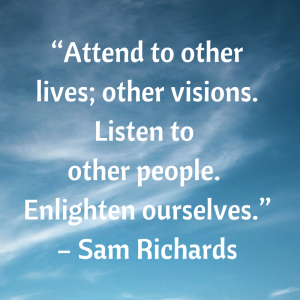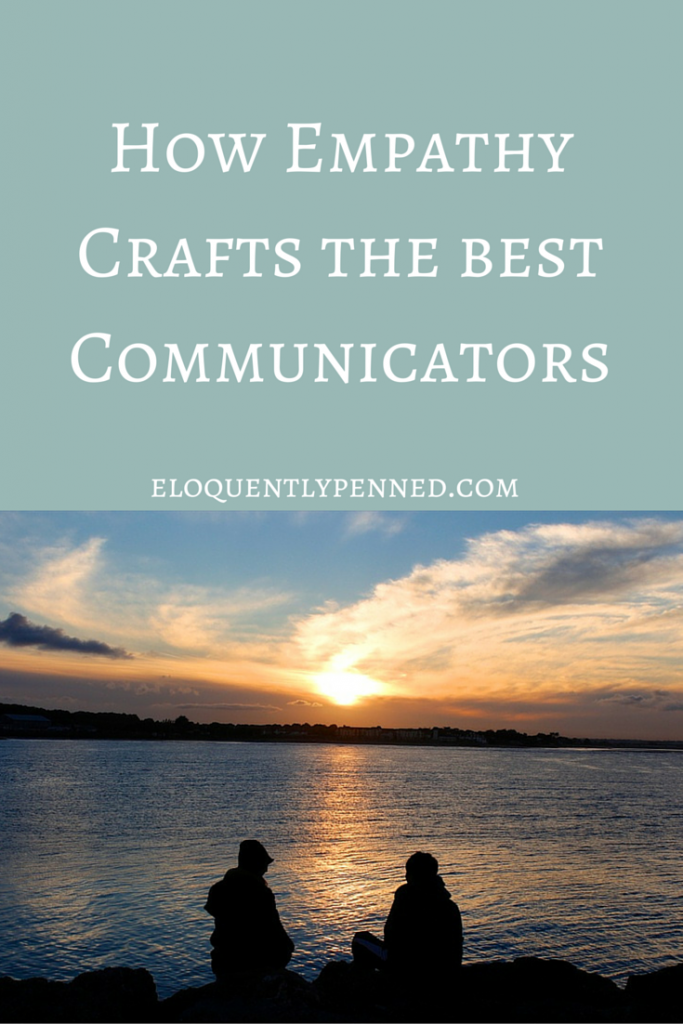
Focusing on the thoughts and needs of others is no easy feat. Communication requires talent. It calls for a quality not possessed by the average person. A trait lacked by some of the most entitled businessmen – empathy.
Why empathy? What makes it significant? Why is this talent retained by influential communicators? In itself, communication relies on attitude. The speaker’s tone and relatability make or break a discussion. Empathy instills this quality.
Sam Richards, a sociologist and professor, spoke on empathy in 2010. In his speech, “A Radical Experiment on Empathy,” Richards lifts you from your small world to one inhabited by another. With an empowering example, he explains the true meaning of empathy. His speech will leave you invigorated. His words will prepare you for the next conflict you encounter.
One skilled in empathy is compassionate.
As Richards maintains, these folks relate, share, and partake in the feelings of others. They are problem solvers. When life derails, these are the solution-seekers we pursue.
Those who are empathetic view life openly. Their perspective may never change, but their ability to recognize the outlook of another is unmatched. It is their nature to appreciate your concerns with compassion.
Who Makes Up Your Circle?
Consider your social circle. Think about your closest friends. Who do you reach out to when life gets hairy? Of those people, who stands out?
-
Which one is most attentive?
-
Who is on speed dial when trouble arises?
-
Which do you call first when you fail?
-
Who builds you up when your latest job venture falls through?
-
When you need a shoulder to cry on, who do you reach out to first?
Now that you have narrowed down your circle, focus on personal attributes. Concentrate on communication style. What sets that crucial friend apart? Their significance rests on their ability to relate.
This is empathy. It this quality that describes your compassionate friend.
People assume this skill is automatic; a natural ability. But empathy is much more than that. It’s a quality that must be nourished. It needs to be learned, understood, and practiced before one can be considered an expert.
Empathy – Where Can It Be Found?
Empathy shows up in the most unexpected places. Great customer services representatives, effective managers, trustworthy accountants – they all share one commonality. It’s the quality that brings you back to one restaurant over another. It is the meaning of your preference of Abby or Amber when you need advice. This trait is the real reason behind the lengthy employment rates of a local business. It’s the real motive behind your neighbor’s preference of one insurance company over another.
It isn’t convoluted, nor is it an exact science. It all comes down to empathy.
The ability to relate will place you in better circles. It will expand your followers and heighten your presence – both socially and professionally. But if you struggle with empathy, don’t sweat it! Remember: it isn’t an innate quality. You may not have mastered it yet. Luckily, there is still time.
There are plenty of ways you can begin this journey. Check out Roman Krznaric’s piece, “5 Ways to Be More Empathetic.” From listening advice to taking an interest in your barista’s life, Krznaric touches on effective ways you can build this skill. You can start with his tips today to better understand the life of your peers.
While Krznaric’s article provides solid examples, there are even more ways to retain this skill. Consider the following notes to better empathize with others.
– Focus On the Conversation
It’s easy to get drenched in conversation. Meaningful discussions seep into something less wholesome. Exchanges morph into subjects you have no interest in.
Uninterested, you get lost. You forget what the original topic was. Instead of focusing on the words of your peers, you ponder over your next statement. Ultimately, the original conversation is lost. To compensate, you craft a new conversation topic.
Rather than relating to your friend’s loss, you bring up an unrelated event. Why? Because you were unable to directly relate to her grief. In doing this, you make a grave social mistake. You toss away the reason your friend conversed with you in the first place. Rather than retaining your friend’s experience, you entice the conversation with an isolated topic.
Next time, focus on the original discussion. Let the topic sink in. Once your mind wanders, your attention will stray, and with it your ability to be empathetic.
– Actively Listen to Your Peers
When conversation gets heated, staying focused is tough. Listening may feel tedious. But good listeners reap benefits, and not everyone can listen well. An empathetic manager will have more luck than one without this skill. The average job hunter will face better opportunities if he listens well.
Pay attention during discussions. Stay active during conversations. No matter the topic, regardless of the situation, heed the words of your peers.
Their point may be lengthy. But remember: they chose you for a reason. So listen. Pay attention to detail. Take note the concerns they voice. Empathy will be far less demanding to master if you hone your listening ability.
– Find a Way to Understand
You won’t agree with everything you hear. Those folks you discuss politics and career choices with at the bar? The coworkers you converse with during business hours? Their perspective differs from yours. This difference may be drastic. You may favor a different political party than your boss.
Fortunately, you needn’t agree with their views. You merely need to understand them.
Your understanding may be limited. You won’t always be able to fully immerse yourself in their shoes. Some differences are far too complex.
Still, some recognition is better than none. In turn, you will soon master the art of empathy.
Progress: An Open Perspective
Empathy is a skill. No one is naturally great at this ability. It’s a quality meant to be taught, learned, and nourished.
Understanding may be tough. You may disagree with your coworker’s perspective. But empathy relies on your ability to relate; to focus.
Step out of your own world. Learn to appreciate the journey of another. And remember: you needn’t agree, you need to empathize.





So true!
Empathy, the ability to actually feel and better understand others emotions and situations keeps everyone more connected and creates more satisfying relationships. Interestingly, too much empathy can haunt us as well. The inability to keep from feeling and becoming too affected by others pain or crisis can be excruciating. I don’t have the remedy for that.
Shelby Berzley, any tips? 😉
That’s a valid point.
Too much empathy can irritate rifts in even the most stable relationship. As for a remedy, that may be a topic for another article. But it all comes down to independent thought. Your ability to think freely without letting the anxiety of another control your actions. Strength, endurance – these are traits we need to nourish. In order to combat empathy as a weakness, we need be the best of ourselves.
Still, empathy in itself needs to be mastered by all. Then, we can focus on the consequences.
Thanks for your feedback!